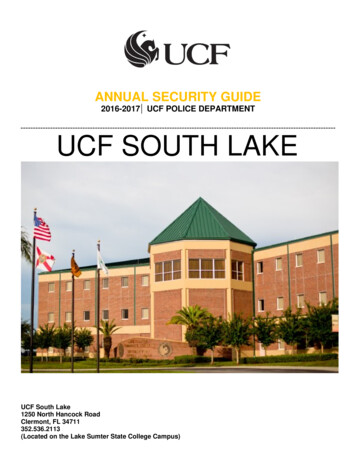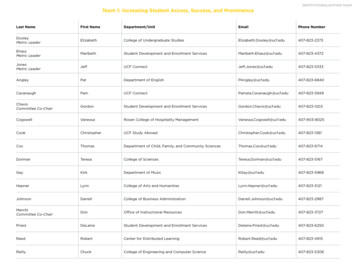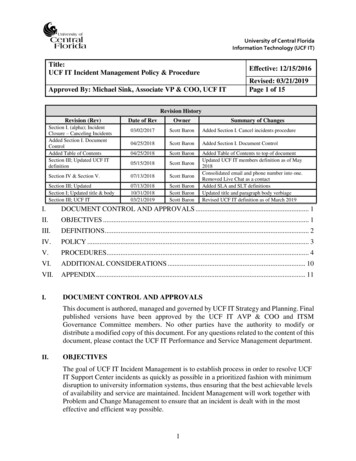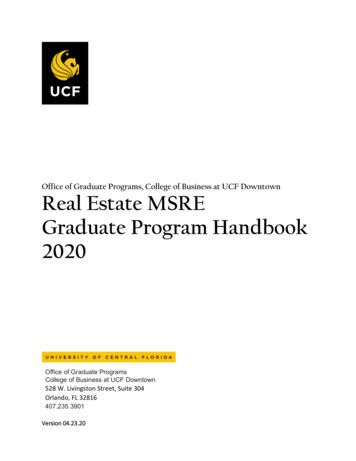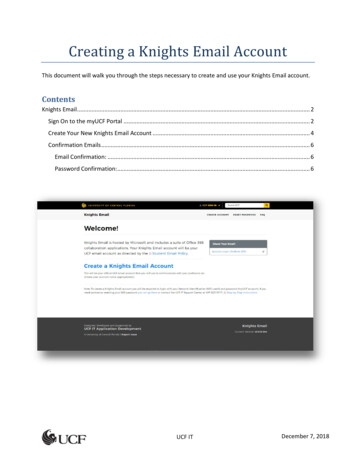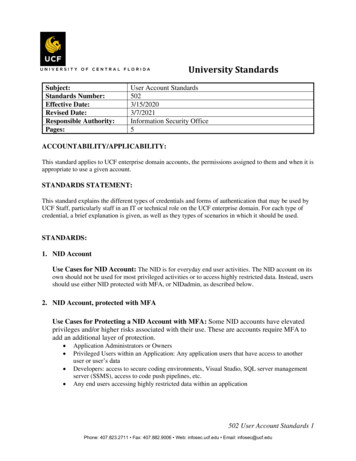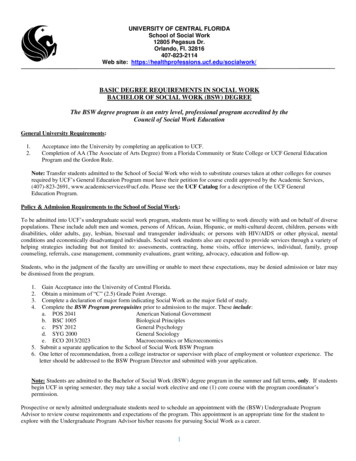
Transcription
University of Central FloridaInformation Technology (UCF IT)Title:UCF IT Service Request Fulfillment Policy & ProcedureEffective: 10/26/2018Revised: 02/03/2022Page 1 of 12Approved By: Matthew Hall, VP of IT and CIORevision HistoryDate of RevOwnerSection III; UCF ITSection III; UCF ITSection VI. BRevision (Rev)03/21/201911/12/201911/12/2019Scott BaronScott BaronScott BaronSection VI. B11/12/2019Scott BaronSection VIII. Appendix; A.04/01/2020Scott BaronAll sections requiring updates02/03/2022Scott BaronI.Summary of ChangesRevised UCF IT definition as of March 2019Revised UCF IT definition as of October 2019Updated “Awaiting Requester Confirmation” and“Closed Complete” (Scenario 2) definitions withnew reopen button/portal processAdded new Pending codes “Change Freeze” &“Awaiting Administrative Time”Added new section; UCF IT Service Offerings –Service and Operational Level Targets. Revisedparticular sections of document impacted by newappendix section.Pertinent updates required; Update to Appendix ADOCUMENT CONTROL AND APPROVALS . 1II.OBJECTIVES . 2III.DEFINITIONS. 2IV.SCOPE . 3V.POLICY . 4VI.PROCEDURES. 4A. Service Desk Ticket Registration. 4B. States – Requested Item and Task State Codes/Stopping the SLA Clock . 5C. Requested Item Cancelation – Task Pending Code of Awaiting Requester Info 9VII.VIII.ADDITIONAL CONSIDERATIONS . 10APPENDIX . 10A. UCF IT Service Offerings* - Service and Operational Level Targets . 10I.DOCUMENT CONTROL AND APPROVALSThis document is authored, managed and governed by UCF IT Strategy and Planning. Finalpublished versions have been approved by the VP of IT & CIO and ITSM GovernanceCommittee members. No other parties have the authority to modify or distribute a modifiedcopy of this document. For any questions related to the content of this document, pleasecontact the UCF IT Performance and Service Management department.1
II.OBJECTIVESThis document is intended to define and describe a consistent service request fulfillmentprocess that aims to improve UCF IT service quality. The service request fulfillmentprocess provides a channel for UCF IT consumers to request and receive active UCF ITservices. The process needed to fulfill a service request will vary depending upon what isbeing requested. The request fulfillment processes and procedures will enable IT staff tomonitor and fulfill service requests quickly, consistently and efficiently.The objectives of the UCF IT Service Request Fulfillment process are to: III.Provide a simple means for the university to receive standard services for which apre-defined approval and workflow process existsProvide customers with a single source of information regarding the UCF ITservices available and how to obtain themDEFINITIONSService Request: Request (defined as a Class Name “Requested Item” withinServiceNow) from a customer for creating, modifying, adding, moving, or removing someor all service functionality, access, or infrastructure components. Referred to as a “catalogitem” within ServiceNow.Service Catalog: The service catalog is part of the service portfolio and containsinformation about two types of IT service: customer-facing services that are visible to theuniversity; and supporting services required by the service provider to deliver customerfacing services.Service Level Agreement (SLA): An agreement between an IT service provider and acustomer. A service level agreement describes the IT service, documents service leveltargets (SLTs), and specifies the responsibilities of the IT service provider and thecustomer.Service Level Target (SLT): A commitment that is documented in a service levelagreement. Service level targets are based on service level requirements and are needed toensure that the IT service is able to meet business objectives. They should be SMART(Specific, Measurable, Attainable, Realistic and Time Bound) and are usually based onkey performance indicators (KPIs).Operational Level Agreement (OLA): An agreement between an IT service providerand another part of the same organization. It supports the IT service provider’s delivery ofIT services to customers and defines the good or services to be provided and theresponsibilities of both parties.2
Interaction: A customer contact recorded by the UCF IT Service Desk. If the contact isan incident or service request, then the agent transfers the information by creating anotherrecord to the applicable incident or requested item table.Ad-hoc Task: A manual (stand-alone) task created on the service request that is not tiedto the predefined catalog task workflow. NOTE: Setting an ad-hoc task to one of thecancel request states will not affect the requested item state. Only catalog tasks driven offthe workflow can cancel a requested item.Catalog Task: A task generated by predefined workflow activity.Requested For: The field within ServiceNow that identifies the individual requestingassistance. This is the customer of the service request.Opened By: The field within ServiceNow that identifies the individual that actuallycreates (submits) the ticket.Work Notes: A field within ServiceNow used to document activities associated with theservice request. This field is internally facing to ServiceNow fulfillers.Activity Log: A field within ServiceNow that is systematically logged which captures allactivities of a ticket such as email notifications sent, work notes updates, additionalcomments added or changes to any fields.IT Service Management (ITSM) application: This is the application (ServiceNow) usedby UCF IT to record incidents, problems, service requests and changes.Information Technology Infrastructure Library (ITIL): A set of best practicepublications for IT service management. Owned by the Cabinet Office (part of HMGovernment), ITIL gives guidance on the provision of quality IT services and theprocesses, functions and other capabilities needed to support them.IV.SCOPEThe process of handling each type of service request can be broken down into a set of welldefined activities and can be documented as a process flow (known as workflows). Theworkflows are all built and stored within the ServiceNow catalog item repository.When defining service request workflows, the service provider should consider thefollowing points: Who will handle the request? - Defines individuals or teams who areresponsible for the request fulfillment.How is the service delivered? - Defines the process of service delivery.3
How quickly will the service request be fulfilled? - Reflects the defined SLA ortime window (SLT). Reference Appendix A. for UCF IT Service and OperationalLevel Targets per each active UCF IT service offering.The UCF IT Service Request Fulfillment Process WILL cover: Service requests associated with active UCF IT services in the service catalogService Level Agreements/Targets and Operational Level Agreements/Targets Continuing to baseline average times to fulfillment across active UCF ITservice offerings. Service and Operational Level Targets can be modifiedand will be added and documented within Appendix A.The UCF IT Service Request Fulfillment Process WILL NOT cover (at this time): V.Non-UCF IT service offeringsSystematically prioritizing service requests (e.g. Incident Management VIP’s)Change requests addressed by the UCF IT Change Management processKnowledge requests addressed by the UCF IT Knowledge Management processPOLICYUCF IT staff members will record and document within the ITSM application(ServiceNow) ALL customer requests for assistance in regard to service requests. UCFIT staff members will follow the UCF IT Service Request Fulfillment procedures toreview, follow-up and fulfill these ticket types in a timely manner. The work notes shouldbe updated routinely (when applicable). All in-scope activity will follow the processdefined by this document.The UCF IT Support Center is the primary point of contact for all customers and will beavailable by multiple methods, including Web, Email or Telephone to facilitate incidentor service request submissions. Web – via self-service portal page: https://ucf.service-now.com/ucfitEmail – itsupport@ucf.eduTelephone – 407-823-5117Requests for service fulfillment will be recorded as requested items in the ITSMapplication (ServiceNow) and will be subject to measurement and reporting.VI.PROCEDURESA.Service Desk Ticket RegistrationThere are currently three ways for a customer to contact the UCF IT Support Centerand request assistance:4
Web (Self-Service Portal Page)A UCF IT Support Center agent creates and triages (if applicable) theweb request (either an incident or service request) from the interactionqueueORThe customer directly submits a service request through the servicecatalog, which is systematically triaged to the service owner Email – A UCF IT Support Center agent converts the email request (ifapplicable) into a ServiceNow ticket (either an incident or service request) Telephone – A UCF IT Support Center agent captures all required informationand creates (if applicable) a ServiceNow ticket (either an incident or servicerequest)The customer is sent an automated acknowledgement email when the ticket iscreated within ServiceNow.B.States – Requested Item and Task State Codes/Stopping the SLA ClockThere are six requested item state codes that are/may be reflected during the lifecycleof a service request (from create to fulfillment). The requested item state codes aredriven off the related workflow tasks and their represented/selected states.NOTE: The requested item states are read-only fields within ServiceNow.The state codes for both requested items and tasks are defined below and reflectwhen the “SLA” clock is running or stopped.NOTE: The current service and operational level targets determined by UCF ITservice providers are identified within Appendix A. The UCF IT serviceproviders have agreed to fulfill the active service offering(s) on an average basisagainst the targets identified. These targets are variable and are subject tochange. The targets identified in Appendix A. are business days and account fortotal time elapsed when the SLA clock is running.5
Requested Item States:StateOpenWork In ProgressPendingAwaiting Requester ConfirmationClosed CompleteCanceled StatusLogged (start the clock). Work to fulfillrequest has not begunA related task has begun/In progress(SLA clock running)ALL related opened tasks are pending(stops the clock)Final workflow task completed (stops theclock). Customer able to reopen withinthree business daysAuto-close/Process owner involvementUnable to reach customer, servicerequest no longer required perconfirmation from customer, removeduplicate ticket(s) or incorrect catalogitem that needs to be resubmitted orconverted to an incidentOpen - The requested item is created within ServiceNow and the approvalprocess has started (if applicable). Work to fulfill the request has not begun.o The SLA clock starts.Work In Progress – Work to fulfill the requested item has begun or is in progress.All approvals have been completed (outside of mid-workflow approvals) and atleast one related task has been set to a “Work In Progress” State.o The SLA clock IS running.Pending – The requested item is awaiting a pending action outside of UCF IT’scontrol, a change freeze is in effect or per University/UCF IT directive, normaloperations conclude earlier than normal business hours due to planned orunplanned events. The pending state will systematically set when one (if solerelated task) or ALL related tasks are in a pending state.o The SLA clock is paused and IS NOT running.Awaiting Requester Confirmation – Following the last task of the requested itemworkflow being completed, the requested item state will systematically set to“Awaiting Requester Confirmation”. The customer will have the option to reopentheir request through email or the self-service portal (a systematic email with aReopen Ticket! button is sent when the requested item state changes to“Awaiting Requester Confirmation” or a Reopen Ticket! button appears withinthe self-service portal when the requested item state changes to “AwaitingRequester Confirmation).o The SLA clock is paused and IS NOT running.NOTE: If an ad-hoc task has been created on the requested item and is notclosed before the last task of the requested item workflow, then the ad-hoc taskwill systematically close to prevent tasks from remaining opened after therequested item is deemed complete. This ServiceNow system action takes placebefore the requested item state changes to “Awaiting Requester Confirmation”.6
An ad-hoc task cannot be created after the state of the requested item changesto “Awaiting Requester Confirmation”. Closed Complete – The requested item has been fulfilled to customersatisfaction.o The closed complete state is systematically set following these two scenarios: Scenario 1: The requested item auto-closes in three business days. Scenario 2: The customer indicates their service request was notfulfilled to their satisfaction by choosing to reopen their requestthrough email or the self-service portal (a systematic email with aReopen Ticket! button is sent when the requested item state changesto “Awaiting Requester Confirmation” or a Reopen Ticket! buttonappears within the self-service portal when the requested item statechanges to “Awaiting Requester Confirmation).Following the customer confirmed reopen, the process owner of thecatalog item will be notified and assigned a task indicating thatcustomer action is required. The newly assigned task will set to anOpen state and the SLA clock will start again (requested item statewill set back to Work In Progress).Once the process owner ensures the request has been fulfilled tocustomer satisfaction, they will close complete the task, which willclose complete the requested item. Canceled – The requested item is no longer required. The assignee of one of theopened requested item related task(s) concludes the request is no longer requiredto be fulfilled (either unable to contact customer for more information, customerindicates they no longer require the service, cancel a duplicate ticket(s) or cancelan incorrect catalog item that needs to be resubmitted or converted to anincident).Task StatesThere are seven task state codes. Only six task state codes can be selected during thelifecycle of a service request. When a task is spawned from the requested item, thestate defaults to Open.StateOpen (defaults – cannot be selected)Work In ProgressPendingClosed CompleteClosed SkippedCancel Request - No Response7StatusWork to fulfill the task has not begunWork to fulfill the task has begunPending action outside of UCF ITcontrol, change freeze in effect orapplicable Admin Time(see Pending Code definitions below)Task fulfilled/completedTask no longer required or applicableService request no longer required due tonot being able to reach customer
Cancel Request - Customer Service request no longer required perconfirmation from customer, removeduplicate ticket(s) or incorrect catalogitem that needs to beresubmitted/converted to an incidentOpen - Work to fulfill the task has not begun. Once a task assignee moves a taskinto “Work In Progress”, the task state of Open will no longer be able to beselected.Work In Progress – Work to fulfill the task has begun.Pending – A task can ONLY be put into a pending state if one of the six pendingcodes below are applicable.NOTE: The task assignee will be required to complete a pending codeselection and reason on why the task is in a pending state.Pending Codes: Awaiting Requester Info – If the task assignee requires additionalinformation from the customer to proceed with the task. Once therequired information is received from the customer, the task should beplaced back into a “Work In Progress” state (if applicable) by the taskassignee.Awaiting Business Decision Outside of UCF IT Control – If adecision to move forward and complete the task is pending a businessdecision to be made that is outside of UCF IT’s control. Once thedecision is made, the task should be placed back into a “Work InProgress” state (if applicable) by the task assignee.Awaiting Vendor – If a task is dependent on third-party vendoraction. Once the vendor takes action, then the task should be placedback into a “Work In Progress” state (if applicable) by the taskassignee.Awaiting Requester Fulfillment Date – If the requested item has beencreated proactively and work cannot start on a task until a future dateapproaches. Once the future fulfillment date arrives, the task assigneeshould place the task into a “Work In Progress” state (if applicable).Awaiting Administrative Time – Per University or UCF IT directive,normal operations conclude earlier than normal business hours due toplanned or unplanned events (i.e., weekday home football game, UCFIT department wide events (picnics, sporting events), unplannedcampus closure, etc.) If the task assignee is impacted and is unable towork on the task, the task should be changed to a State of “AwaitingAdministrative Time” when the event time approaches. The followingbusiness day, the task assignee is responsible to put the task back inits previous State.8
Change Freeze – At certain critical times of the year (semester start),UCF IT imposes a change freeze period. During this time, it is thediscretion of each UCF IT department to authorize or prohibitcontinued work to fulfill a service request. The UCF IT department ispermitted to use the “Change Freeze” Pending Code during thechange freeze window. Following the change freeze window end, thetask should be placed back into a “Work in Progress” state (ifapplicable) by the task assignee.Closed Complete – Task fulfilled/completedClosed Skipped – Task no longer required or applicable. Next task of theworkflow will be spawned (if applicable) and the service request is still requiredto be fulfilledCancel Request - No Response – Service request no longer required. Unable toreach customer for additional information after three attempts (See Section C. forthis process). This selection will cancel the catalog item and the requested itemstate will change to Canceled.Cancel Request - Customer – Customer confirmed the service request is nolonger required.NOTE: This task state should also be used if the service request is beingcanceled due to being a duplicate ticket or if the request was incorrectlysubmitted using the wrong catalog item/request needs to be converted toan incident. The customer should be informed that their request will becanceled to ensure there is no confusion when the applicable cancelnotification is spawned. This selection will cancel the catalog item andthe requested item state will change to Canceled. The task assignee willbe required to complete a reason for canceling.If the service request is being canceled due to an incorrectly submittedcatalog item/conversion to an incident, it is mandatory the task assignee(who is canceling the service request) work with the customer to havethe correct catalog item/incident submitted.C.Requested Item Cancelation – Task Pending Code of Awaiting RequesterInfoIf a task assignee cannot proceed with fulfilling the task due to needing additionalinformation from the customer, the task assignee should change the state of the taskto “Pending” and select the pending code of “Awaiting Requester Info”.Following the task being moved to “Awaiting Requester Info”, the task assignee isresponsible to reach out to the customer to obtain the information needed to proceedwith the task fulfillment. If the task assignee is unable to speak with the customerupon the first contact, the task assignee should leave a voicemail message (ifavailable) for the customer containing their name, phone number and the ticketnumber.9
The assignee of the task must make two more attempts using one other method ofcommunication (ex. email or instant message) on two subsequent business days,preferably at different hours each day (e.g., do not attempt all three contacts at 9 AMin case your customer will never be available at that time of the day). If an out ofoffice (OOO) email is received, the assignee of the task must wait until the customerreturns to contact a third time. The work notes must be updated with each contactattempt.After three attempts of trying to contact the customer with no success, the taskassignee IS permitted to cancel the service request by selecting the “Cancel Request– No Response” task state. Changing the task state to “Cancel Request – NoResponse” will cancel the requested item and prompt the task assignee to complete areason for canceling the service request.VII.ADDITIONAL CONSIDERATIONS VIII.All existing and new staff members of UCF IT are expected to be familiar withthe intent and the contents of the service request fulfillment policy andprocedure.All violations to the service request fulfillment policy will be monitored, staffmembers of UCF IT will be coached by the respective management and repeatoffences could lead to additional disciplinary action.APPENDIXA.UCF IT Service Offerings* - Service and Operational Level TargetsUCF IT Service OfferingsAbsolute Data and Device Security Asset ManagementAccess to Terminated Email AccountActive Directory ChangeActive Directory Provision/De-ProvisionAdd a Windows server to the manual update groupAdd, Remove, or Reset Admin AccountAirwatch Mobile Device ManagementAmazon Web Services (AWS) WorkApplication User AccessAppSenseAzure WorkBackup Restore VM API (Granular)Backup ServicesCall Block RequestCloud ConsultationConfiguration Manager Shared ServicesCrashPlan Endpoint BackupData File Exchange Support via SFTPDeprovision Email Account10Target (Business Days)42543047154555551557122
DHCP Scope Provisioning and MaintenanceDHCP Tool User MaintenanceDistributions Group ChangeDocuSign OnboardingDocuSign Security & Organization ChangesDoor & Traka Box AccessDropbox AdvancedDynamic Forms OnboardingDynamic Forms User & Organization ManagementEndpoint User AccessF5 Application DeliveryFederated Identity SSO RequestGeneral RequestHardware RequestInformation Security Consulting RequestInternal Firewall RequestIPAM RequestISO Application Access RequestIT ConsultationKnights Email Address ChangeLinux Services SupportLinux SFTP/SSH (Port 22) AccessListserv Broadcast EmailsListserv Create, Change, or RemoveListserv General RequestsListserv Owner Training Course AccessLoaner EquipmentMicrosoft SQL Database SupportMicrosoft TeamsMicrosoft Teams External Application ConnectorISO Vendor Risk Management Review (OLA)MySQL DatabaseNAS/NSF, Physical SANNetwork Consulting ServicesNew Shared FolderNew Titanium User AccessNID Account Access De-provision RequestNon-internet Facing DNSNSX Network RequestOffensive Security ServicesOffice 365 Shared MailboxOracle Database SupportPhonebook AssistancePhysical Server HostingPinnacle RequestProject Management ServicesProtect Your Application or Service with 52662554272131053201043057307833023030
Protect Your Enterprise Microsoft M365 with Multi-factorAuthenticationProtect Your myUCF account with Multi-factorAuthenticationPublic Firewall/DNS RequestPublic Records RequestQ Drive RequestQualtrics Survey Platform AssistanceRequest for Microsoft Team Name ChangeRMA (Return Merchandise Authorization) EquipmentRoles and ResourcesSecret Server RequestSecurity Awareness and EducationSecurity Operations Center (SOC)Security Risk AssessmentSecurityCenter Report ManagementServer Software ChangeServiceNow Report or Homepage RequestServiceNow Request ManagementServiceNow User & Group ManagementShared Services ConsultationSharePoint AccessSharepoint Site MigrationsSoftware Packaging and DeploymentSoftware RequestSponsored Account Application SupportSSL CertificateSudo Access for Oracle DBSudo Access for RedHat LinuxUCF AppsUCF Connect Event SupportUCF IT FourWinds RequestVendor Risk Management (VRM)Virtual Machine ChangeVirtual Machine CreateVirtual Machine DecommissionVirtual Machine SnapshotVLAN ManagementVulnerability DisclosureWindows Server AccessZoom App Marketplace Request*Active services offered within the UCF IT Service Catalog. Targets are subject to 06142541510530
Service Catalog: The service catalog is part of the service portfolio and contains information about two types of IT service: customer-facing services that are visible to the university; and supporting services required by the service provider to deliver customer- . Information Technology Infrastructure Library (ITIL): A set of best practice
